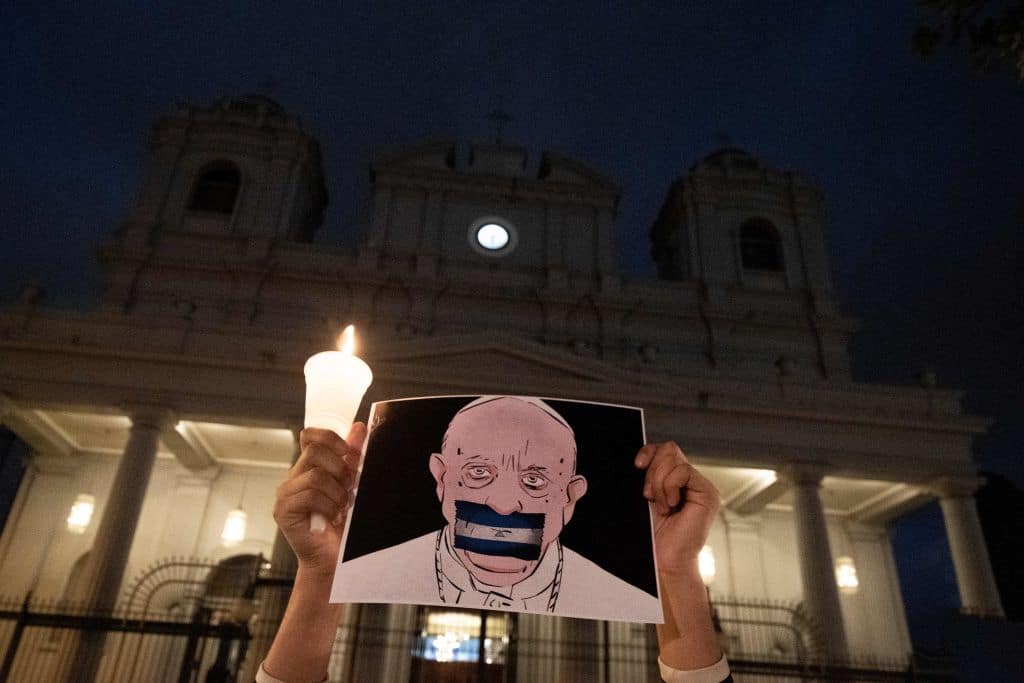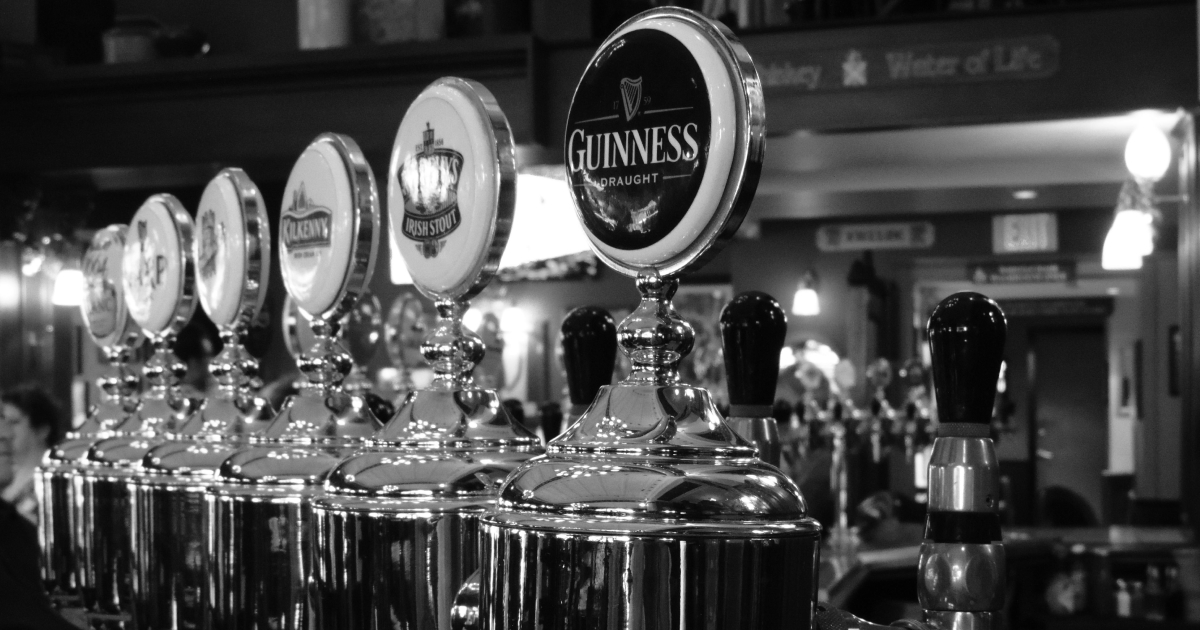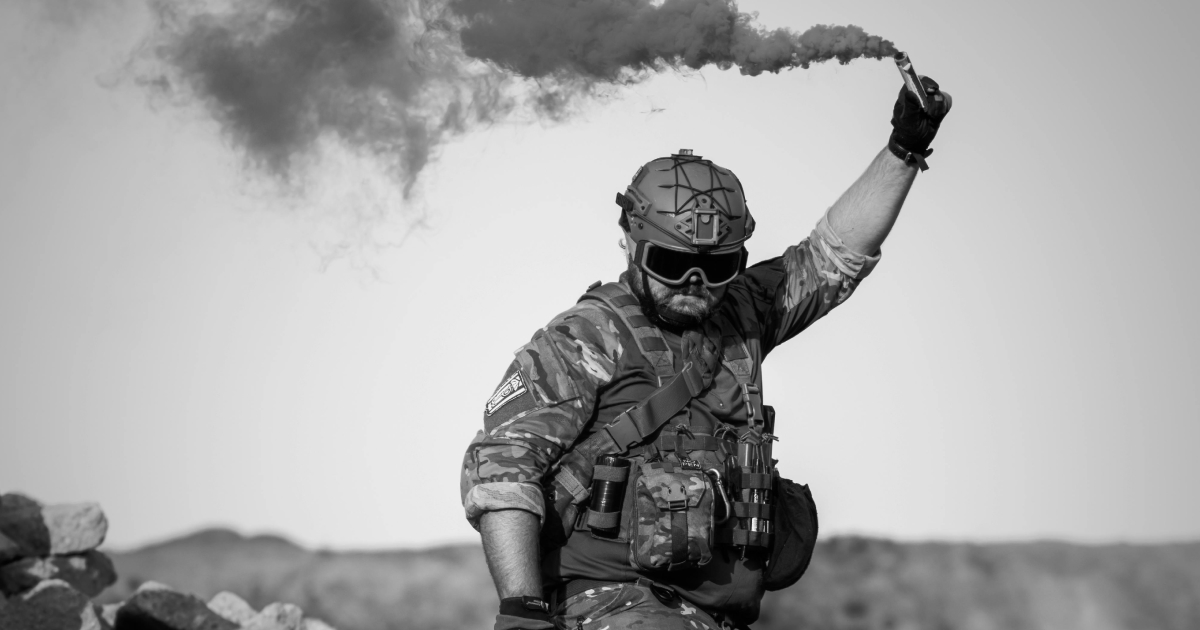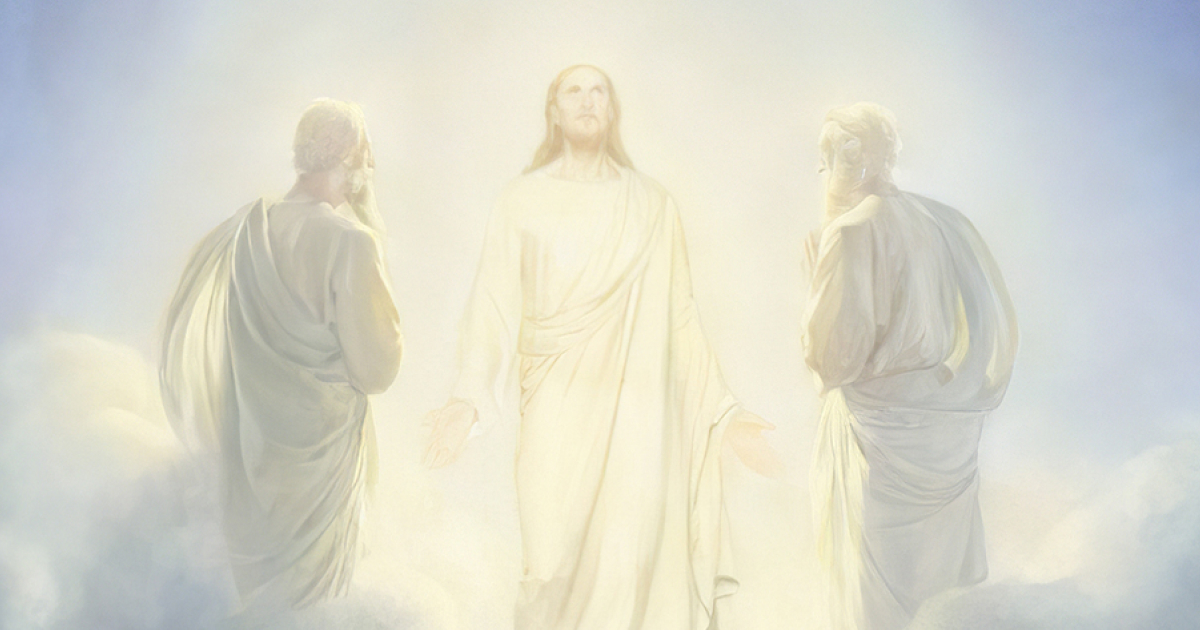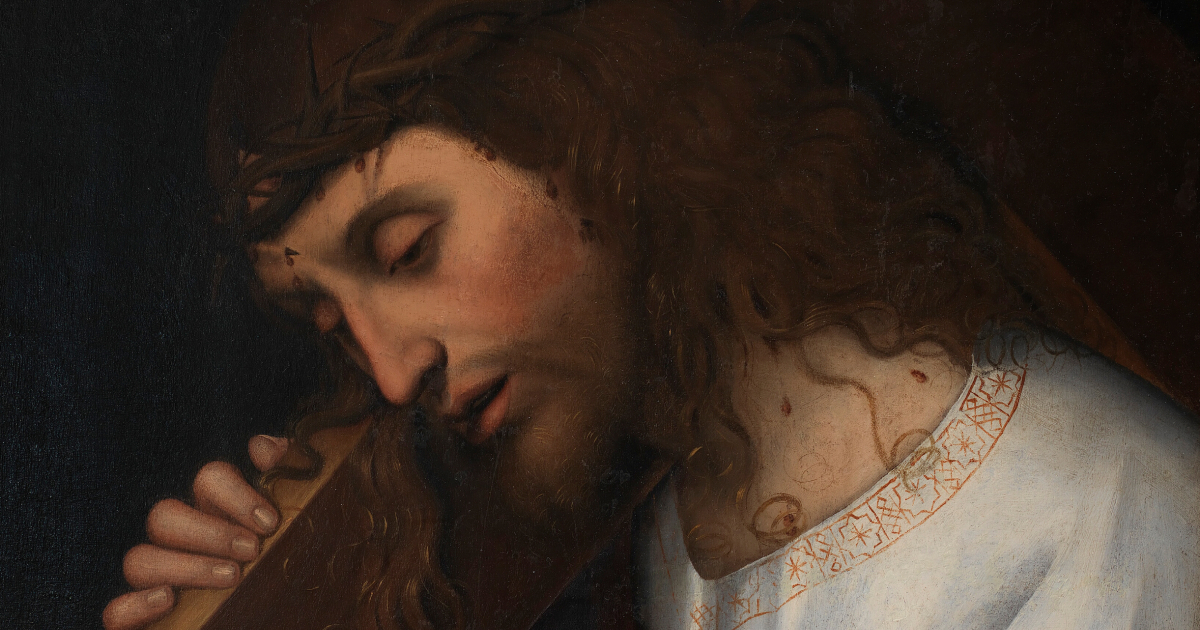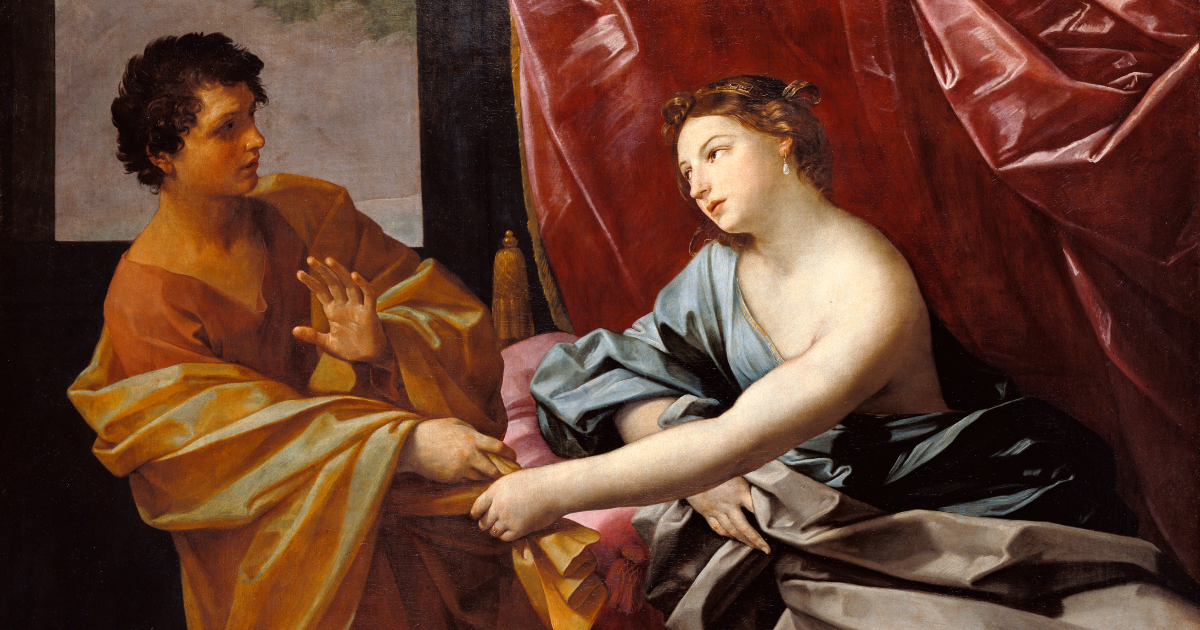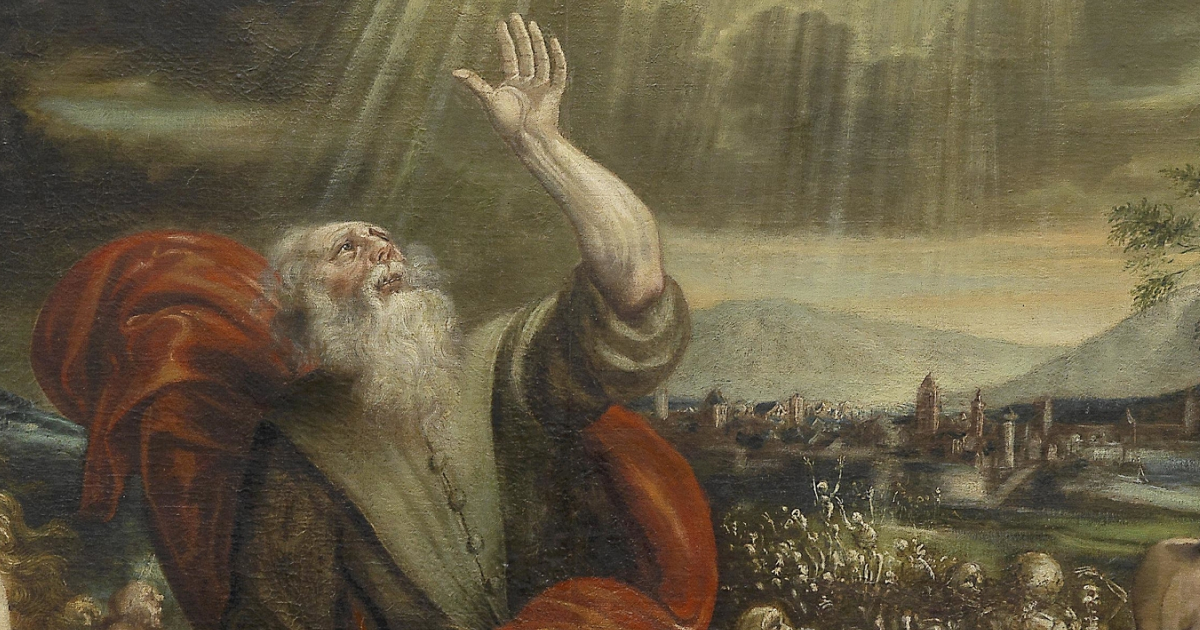Human rights defender Bianca Jagger has called upon Catholic leaders around the world to speak out forcefully against the persecution of the Church in her native Nicaragua. Speaking to the Catholic Herald, Jagger, the founder and president of the Bianca Jagger Human Rights Foundation, and a Catholic, urged the Church to condemn the regime of Daniel Ortega for its arrest and imprisonment of Catholic bishops, priests and laity.
She said the Socialist president of Nicaragua and Rosario Murillo, his vice-president and wife, were waging a “brutal war” against the Catholic Church because they saw it as the last remaining political opposition to his dictatorship. Jagger said: “Of course what Ortega and Murillo want is to get rid of all the leaders of the Catholic Church, all the courageous and eloquent leaders.”
“Anyone who has been a grass-roots leader or a political leader in Nicaragua who has spoken in defence of human rights and democracy is in jail today,” she continued. “The strategy is to get rid of any powerful leader or any dissenting voice and the most powerful leaders left in Nicaragua – because the others are in jail or because they have had to flee the country – are the bishops and the priests.
“ the people who speaking up for the people, defending human rights and denouncing the atrocities taking place in the country – they are the men of the people.” She added: “Their audience is not just the Catholics in Nicaragua. The people are inspired. The people have become more religious. This is a battle between good and evil – this is more evident than ever.”
She said that it would be tragic for the people of Nicaragua if bishops and priests were forced into exile and said Pope Francis should resist the temptation to agree to their removal from the country. Instead, she said she believed the Holy Father should speak out forcefully in defence of clerics persecuted for their defence of the poor.
Her comments came the day after security forces in Nicaragua raided the offices of the Diocese of Matagalpa to arrest Bishop Rolando Álvarez, an outspoken critic of human-rights abuses. He had been holed up in his house, in the capital Managua, for 16 days with 11 other people while police surrounded the building and refused to allow any food or medicines to be taken in.
The police said their operation, carried out at 3.20 am, was aimed at “the recuperation of normalcy for Matagalpa’s citizens and families”. They also said they are investigating the bishop on suspicion of “trying to organise violent groups, inciting them to execute acts of hate against the population, provoking an environment of chaos and disorder, disturbing the peace and harmony in the community with the objective of destabilising the Nicaraguan state and attacking the constitutional authorities”.
As the Catholic Herald went to press, Bishop Álvarez had been transferred to a house belonging to his relatives. Cardinal Leopoldo Brenes of Managua has been able to visit him there, but no-one else has access to him. Priests and seminarians also removed from the chancery in the raid were, however, being held in “the Directorate of Judicial Assistance”, a prison known as El Chipote which is notorious for the torture of political dissidents.
Pope Francis, who has been under pressure to condemn the crackdown, responded by using his Sunday Angelus to call for “peaceful coexistence”. “I am closely following, with worry and sorrow, the situation created in Nicaragua, and which involves people and institutions,” the Holy Father said. “I want to express my conviction and my wish that through an open and sincere dialogue they can find the basis for a respectful and peaceful coexistence.
“Let us ask the Lord, through the intercession of Our Lady Most Pure, that he inspire such concrete will in the hearts of all.” The pope made no mention of either President Ortega or Bishop Álvarez or suggested how such dialogue might take place.
The Vatican’s diplomatic capabilities have been limited by the expulsion in March of the apostolic nuncio in Nicaragua, Archbishop Waldemar Stanisław Sommertag, which caused “surprise and pain” to the Holy See. Since 2018 there have been more than 190 attacks against the Church, its bishops, priests, faithful and houses of worship.
Ortega has repeatedly insulted Catholic clergy, calling them “demons in cassocks”, “terrorists” and “coup plotters”. Several clerics have been forced into exile and in July the Missionaries of Charity were also expelled from the country. Catholic television and radio stations have also been closed down as part of a campaign against the media in general.
President Ortega has often been antagonistic toward to the Catholic Church. He first came to power as the leader of the Sandinista National Liberation Front, Marxist guerrillas who emerged victorious from a brief civil war against the dictatorship of Anastasio Somoza in 1979. More than any other country in Latin America, Nicaragua was “a laboratory for the various liberation theologies’ claims” and ahead of the pope’s visit to Nicaragua in 1983, Ortega personally intimidated the papal nuncio, once driving up to the nunciature in a red sports car followed by jeeps of heavily armed soldiers.
For the papal Mass in Managua, icons of Marx, Lenin and other revolutionary heroes were cleaned up and placed in proximity to the altar, and the closest blocks of seats were packed with Sandinista supporters, who attempted drown out the pope’s words. Engineers turned down the pope’s microphone and turned up microphones placed among the agitators until finally John Paul shouted, “Silencio!” over the heckling.
John Paul caused further embarrassment to the president when he ordered Fr Ernesto Cardenal to regularise his position in the Church after his refusal to give up political office at the behest of the bishops, before suspending him the following year. Pope Francis has since absolved all canonical censures imposed upon Fr Cardenal, a liberation theology activist, and has readmitted him to the exercise of the priestly ministry.
Such clemency has failed to stop Ortega’s campaign. Churches have been shot at and clergy assaulted, and death threats issued against bishops, especially Auxiliary Bishop Silvio José Báez of Managua, who has denounced state repression on social media and was threatened with reprisals so worrying that he was called to Rome. Mounting animosity has followed the Church’s call for democratic reforms and for human rights to be upheld.
Ortega eventually agreed to elections in 2021 but he and Murillo cleared the field of opposition by arresting seven other presidential candidates along with 140 politicians, intellectuals, businessmen, former diplomats and journalists. They include former Sandinista rebels who had once fought alongside him. At the same time, cathedrals and churches were attacked and firebombed, and clergy cast as enemies of the people siding with “coup plotters”.
The intimidation of Bishop Báez worried Pope Francis so much that he persuaded the prelate to go into exile in Miami. From the United States, the bishop continues to rail against Ortega’s regime, calling on the people of Nicaragua to not be afraid “even if the force of evil seems like an insurmountable storm”, while within the country those daring to speak out are being arrested and imprisoned without trial.
Human rights defender Bianca Jagger has called upon Catholic leaders around the world to speak out forcefully against the persecution of the Church in her native Nicaragua. Speaking to the Catholic Herald, Jagger, the founder and president of the Bianca Jagger Human Rights Foundation, and a Catholic, urged the Church to condemn the regime of Daniel Ortega for its arrest and imprisonment of Catholic bishops, priests and laity.
She said the Socialist president of Nicaragua and Rosario Murillo, his vice-president and wife, were waging a “brutal war” against the Catholic Church because they saw it as the last remaining political opposition to his dictatorship. Jagger said: “Of course what Ortega and Murillo want is to get rid of all the leaders of the Catholic Church, all the courageous and eloquent leaders.”
“Anyone who has been a grass-roots leader or a political leader in Nicaragua who has spoken in defence of human rights and democracy is in jail today,” she continued. “The strategy is to get rid of any powerful leader or any dissenting voice and the most powerful leaders left in Nicaragua – because the others are in jail or because they have had to flee the country – are the bishops and the priests.
“[They are] the people who speaking up for the people, defending human rights and denouncing the atrocities taking place in the country – they are the men of the people.” She added: “Their audience is not just the Catholics in Nicaragua. The people are inspired. The people have become more religious. This is a battle between good and evil – this is more evident than ever.”
She said that it would be tragic for the people of Nicaragua if bishops and priests were forced into exile and said Pope Francis should resist the temptation to agree to their removal from the country. Instead, she said she believed the Holy Father should speak out forcefully in defence of clerics persecuted for their defence of the poor.
Her comments came the day after security forces in Nicaragua raided the offices of the Diocese of Matagalpa to arrest Bishop Rolando Álvarez, an outspoken critic of human-rights abuses. He had been holed up in his house, in the capital Managua, for 16 days with 11 other people while police surrounded the building and refused to allow any food or medicines to be taken in.
The police said their operation, carried out at 3.20 am, was aimed at “the recuperation of normalcy for Matagalpa’s citizens and families”. They also said they are investigating the bishop on suspicion of “trying to organise violent groups, inciting them to execute acts of hate against the population, provoking an environment of chaos and disorder, disturbing the peace and harmony in the community with the objective of destabilising the Nicaraguan state and attacking the constitutional authorities”.
As the Catholic Herald went to press, Bishop Álvarez had been transferred to a house belonging to his relatives. Cardinal Leopoldo Brenes of Managua has been able to visit him there, but no-one else has access to him. Priests and seminarians also removed from the chancery in the raid were, however, being held in “the Directorate of Judicial Assistance”, a prison known as El Chipote which is notorious for the torture of political dissidents.
Pope Francis, who has been under pressure to condemn the crackdown, responded by using his Sunday Angelus to call for “peaceful coexistence”. “I am closely following, with worry and sorrow, the situation created in Nicaragua, and which involves people and institutions,” the Holy Father said. “I want to express my conviction and my wish that through an open and sincere dialogue they can find the basis for a respectful and peaceful coexistence.
“Let us ask the Lord, through the intercession of Our Lady Most Pure, that he inspire such concrete will in the hearts of all.” The pope made no mention of either President Ortega or Bishop Álvarez or suggested how such dialogue might take place.
The Vatican’s diplomatic capabilities have been limited by the expulsion in March of the apostolic nuncio in Nicaragua, Archbishop Waldemar Stanisław Sommertag, which caused “surprise and pain” to the Holy See. Since 2018 there have been more than 190 attacks against the Church, its bishops, priests, faithful and houses of worship.
Ortega has repeatedly insulted Catholic clergy, calling them “demons in cassocks”, “terrorists” and “coup plotters”. Several clerics have been forced into exile and in July the Missionaries of Charity were also expelled from the country. Catholic television and radio stations have also been closed down as part of a campaign against the media in general.
President Ortega has often been antagonistic toward to the Catholic Church. He first came to power as the leader of the Sandinista National Liberation Front, Marxist guerrillas who emerged victorious from a brief civil war against the dictatorship of Anastasio Somoza in 1979. More than any other country in Latin America, Nicaragua was “a laboratory for the various liberation theologies’ claims” and ahead of the pope’s visit to Nicaragua in 1983, Ortega personally intimidated the papal nuncio, once driving up to the nunciature in a red sports car followed by jeeps of heavily armed soldiers.
For the papal Mass in Managua, icons of Marx, Lenin and other revolutionary heroes were cleaned up and placed in proximity to the altar, and the closest blocks of seats were packed with Sandinista supporters, who attempted drown out the pope’s words. Engineers turned down the pope’s microphone and turned up microphones placed among the agitators until finally John Paul shouted, “Silencio!” over the heckling.
John Paul caused further embarrassment to the president when he ordered Fr Ernesto Cardenal to regularise his position in the Church after his refusal to give up political office at the behest of the bishops, before suspending him the following year. Pope Francis has since absolved all canonical censures imposed upon Fr Cardenal, a liberation theology activist, and has readmitted him to the exercise of the priestly ministry.
Such clemency has failed to stop Ortega’s campaign. Churches have been shot at and clergy assaulted, and death threats issued against bishops, especially Auxiliary Bishop Silvio José Báez of Managua, who has denounced state repression on social media and was threatened with reprisals so worrying that he was called to Rome. Mounting animosity has followed the Church’s call for democratic reforms and for human rights to be upheld.
Ortega eventually agreed to elections in 2021 but he and Murillo cleared the field of opposition by arresting seven other presidential candidates along with 140 politicians, intellectuals, businessmen, former diplomats and journalists. They include former Sandinista rebels who had once fought alongside him. At the same time, cathedrals and churches were attacked and firebombed, and clergy cast as enemies of the people siding with “coup plotters”.
The intimidation of Bishop Báez worried Pope Francis so much that he persuaded the prelate to go into exile in Miami. From the United States, the bishop continues to rail against Ortega’s regime, calling on the people of Nicaragua to not be afraid “even if the force of evil seems like an insurmountable storm”, while within the country those daring to speak out are being arrested and imprisoned without trial.






